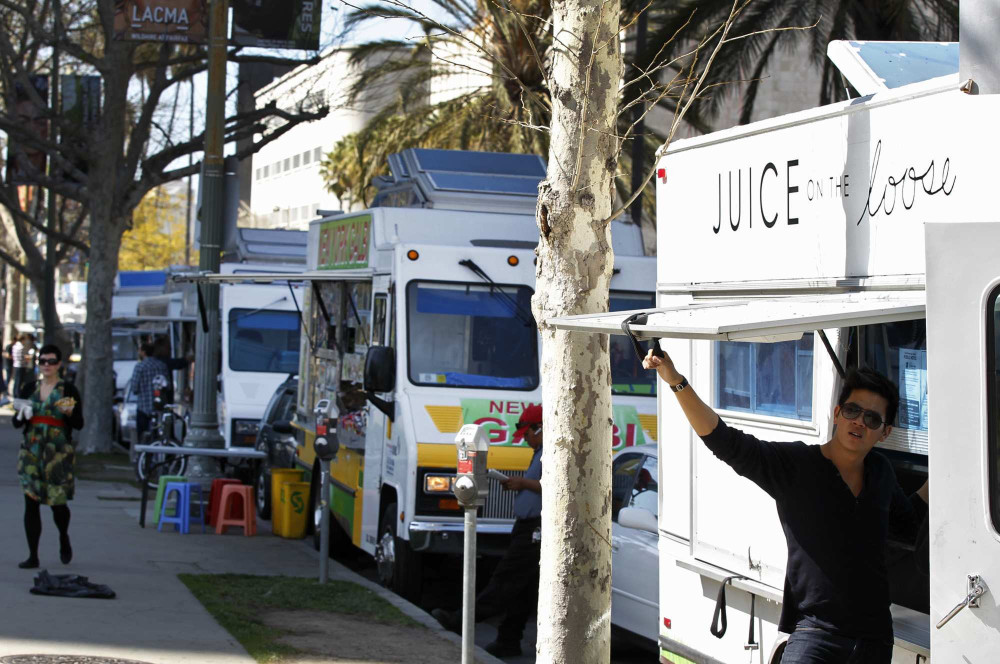By Maryann Batlle
Naples Daily News, Fla.
LEE COUNTY, Fla.
The warning was for “selling BBQ without temp permit.”
Lee County Code Enforcement handed it to Leslie A. Hall last month for parking his mobile food joint, Porkin-Out, at Battista Farms, a plant nursery that faces U.S. 41 in San Carlos Park.
Though he was charged no fine, Hall said Porkin-Out will stay off the road until Lee lets food truck owners earn an honest living.
“They don’t want to allow you to make a full-time business out of it,” Hall said. “To me, that’s infringing on my rights.”
Nationwide, food trucks have become a trendy option for those craving epicurean adventures. In Southwest Florida, some entrepreneurs say they are turning to food trucks because they have lower overhead costs than traditional restaurants.
“There are a lot of chefs out there who can do some freaky fun stuff on a food truck,” said Z. Zackary Ziakas, co-owner of The Sizzle Truck, a Collier County-based mobile eatery that serves sandwiches and a variety of meats.
But local zoning and land development rules, many in place before the rise of mobile gourmet dining, favor brick-and-mortar restaurants by placing cumbersome restrictions on food trucks. Critics say those restrictions stymie economic opportunities for budding entrepreneurs.
In Florida, the state handles health inspections and licensing for food trucks, as it does with brick-and-mortar restaurants. But a patchwork of local community development policies regulate where food trucks can be and for how long.
Food trucks in unincorporated Lee County are required to operate under 30-day, temporary use permits that can be renewed for the same location up to four times a year, with 45-day breaks in between. Each temporary use permit costs $175. Food trucks are allowed at permitted special events.
Collier will issue temporary use permits to mobile vendors that are good for 14 days, consecutive or not, in unincorporated parts of the county. The $200 permits can be renewed once a year for the same location. Food trucks in Collier can also set up at farmers markets and special events.
Last week, Lee commissioners asked staff to review the county’s food truck policies. Commissioner Brian Hamman raised the issue after meeting with Hall.
“Some of these laws seem to be antiquated when applied to these small businesses,” Hamman said. “I didn’t suggest anything specific.”
Not everyone on the commission was enthusiastic about taking another look at the policies. Too much change could lead to roadside vendors selling rugs and clothes on street corners, said Commissioner Cecil Pendergrass.
“You don’t want it to look like a flea market across the county,” Pendergrass said.
Collier is considering a review of its food truck policies when it updates the land development code, said Kate Albers, a county spokeswoman.
Ziakas said he and his business partner, Anthony Badalamenti, spent more than $125,000 to make the Sizzle Truck top-of-the-line before it officially launched in Collier about two months ago. Ziakas said he was concerned about being hand-tied during Collier County’s permitting process but tried anyway.
“It wasn’t cut and dry and easy, but they were definitely open,” said Ziakas. “We’re still on a trial basis. I think we are being watched.”
Cities set their own standards, which can be tougher than county standards.
Naples does not grant permits to mobile vendors unless they are part of a special event, said Naples Planning Director Robin Singer.
Brick-and-mortar restaurants pay rent and “it is a problem if people are setting up in parking lots,” Singer said.
By ordinance, only five mobile vendors at a time can be permitted in Bonita Springs. They are banned from a redevelopment overlay district on Old 41 Road between Bonita Beach Road and Rosemary Drive unless there is a special event or the food truck vendor obtains “letters of no objection” from schools, day care centers, churches, restaurants and residences within 500 feet.
“The point was to give brick-and-mortar restaurants a fair shot,” said Bonita Springs Planner Jennifer Hagen. “We are looking to infill that area.”
The rules maintain the city’s quality of life, said Bonita City Manager Carl Schwing.
“The food truck industry would probably not consider it friendly,” Schwing said.
For the last four years, Cape Coral has been working on an ordinance that tries to balance the needs of the food truck movement and the community, said Frank Cassidy, code compliance division manager for the city.One of the biggest priorities is ensuring food trucks move from place to place, Cassidy said.
“If you don’t want to move, you’re not mobile anymore,” he said.
When it cited Hall, Lee Code Enforcement acted on a complaint from a neighboring business that wanted to remain anonymous, according to the county’s Community Development Department.
Since then, Hall parked his Piggin-Out trailer at a storage facility in Fort Myers. He said he only takes it out to cater events he committed to before the county warning.
Hall, who has another job, estimates he invested more than $50,000 into the mobile eatery, which has a custom smoker that can cook 300 pounds of meat at a time. Cedar panels give the trailer a mountain cabin look and took him days to build by hand, Hall said.
The North Carolina-native plans to eventually continue bringing his brand of southern-style smoked brisket, pulled pork and ribs throughout Lee, including to Battista Farms, which said it wants him back. But Hall said he’s holding off until Lee County gives him a better deal.
“I don’t want to create too much grief,” Hall said, “but I do want to operate.”














































































































































































































































































































































































